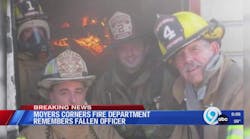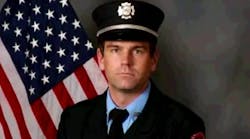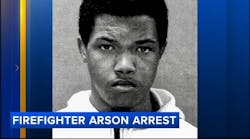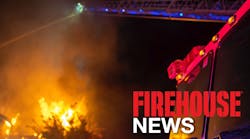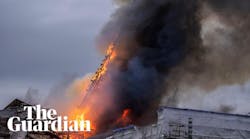And then we get information that simply kicks us in the stomach.
This weekend, a New Jersey firefighter was injured when she fell off the back of the apparatus while in route to a social activity.
It?s 2004 and so many good folks in our business are working their butts off in an attempt to reduce firefighter injury and death. There have never been more been meetings, summits and all sorts of training programs to reduce firefighter injury and death. The IAFC, the IAFF, the NVFC, the USFA and many others have never worked harder on this issue than they are now.
So then what happens?
What happens is that the message is not reaching everyone that it needs to reach, or they are simply not paying attention.
This past weekend some well-intentioned firefighters get on their apparatus, riding the tailboard, and proceed to a new fire engine ?wetdown? in a neighboring community. Then the predictable happens. One of the firefighters falls off the apparatus and gets hurt, luckily not seriously.
What is the problem?
The problem is that according to the article, a local resident is quoted as suggesting the firefighters should not have been riding outside of the apparatus. And that firefighters, according to this resident, should always be mindful of caution and safety. The local resident identified the problem.
THE LOCAL RESIDENT SAW THAT IT WAS A PROBLEM.
Fortunately, the firefighter wasn?t hurt seriously. But what if she had been? Or what if she was killed. It would be called a ?Line Of Duty Death?, and all the nation would be mourning. Hearts would be broken. Memorials would be set up. And maybe someone would start thinking about the fact that maybe we might be better off not riding the outside of the apparatus!
Think this is an old problem that had been fixed? I did too.
A few months ago we wrote a commentary about how the Pittsburgh Fire Department has forced some of their members to ride tailboards on reserve apparatus. And one fell off and was hurt. We have been also sent several pictures of firefighters riding tailboards and running boards in March of 2004!
Then last month, history tragically repeated itself when veteran Brookline, Mass. Firefighter Buss Gross was killed when he fell out of a rig. And this past weekend in New Jersey, a firefighter fell off the back of the rig while riding tailboard to a new fire apparatus ?wetdown?. So what?s the answer?
Accountability.
Now, when I say accountability I am not talking about some rarely effective luggage tags that we pretend to track firefighters with. I am talking about personal accountability at the level of every member of any fire department to focus on making sure we don?t get hurt or killed.
Honestly, I could care less about whatever excuse existed for that firefighter to ride tailboard because she could have been killed. Nothing is so important that we have to risk our members on stuff like that. She is someone?s daughter, and almost ended up being someone?s badly hurt daughter, or crippled daughter or worse.
I absolutely love my kids. I am sure her parents love her. We have a responsibility to make sure they all come home after the run, even if we have to think of our firefighters as our ?own? kids. Actually, they are. Their parents loan us their kids and expect us to take good care of them. The horrible consequences of not taking care of the firefighters as if they are our own are well documented.
As so many have said before, this ain?t rocket science.
What is getting us hurt or worse?
- 1-Hazmat? Nope.
- 2-WMD? Nope.
- 3-Terrorism? Nope.
- Forgetting the basics on what we do and respond to on a day to day basis? Yep.
But yet everyone and their mothers wants funding to take care of the above three concerns. And are they a problem? Sure! But there is no way that we will be able to even think about handling hazardous material incidents, weapons of mass destruction challenges and terrorism response until we figure out that if we ride on the back of a fire engine, we will probably get hurt and maybe get killed. We cannot possibly handle the above three major concerns if we don?t know how to expertly:
- Drive the apparatus carefully.
- Provide officers to clearly and strongly command and control a scene.
- Backup apparatus without running into the firehouse or ripping off the compartment doors.
- Properly wear our protective clothing and related equipment.
- Know how to and when to vent.
- Put a seat belt on before the rig moves.
- Stretch a line and have proper water flows.
- Develop an effective and affordable radio that allows us to communicate on the fire ground.
- Not get run over while operating on a scene.
- Track our crews on the fire ground.
Just a few basics that can absolutely reduce the injuries and deaths we keep reading about.
It?s 2004 and honestly, when I read the news article I thought it was an archive that someone sent me. But it wasn?t. It was reality and as the hippy T-shirt says, ?REALITY SUCKS?.
Some of our Brothers and Sisters justifiably die in the line of duty each year. These are the small group of brave firefighters who attempt to save a life and end up losing theirs in situations where the risk/benefit was determined. At the time it was worth the risk. Those are genuine Line of Duty Deaths and the risk that those firefighters take is well beyond just simple words of honor. Without question, their supreme sacrifice is in the highest form, traditions, service and respect of the fire service.
On the other hand, many of our Brothers and Sisters get injured in situations that could have been avoided. Some of those are at simple basic levels of supervision or self-supervision and accountability. We are glad that the firefighter who fell from the tailboard of the apparatus this weekend is fine. Maybe her accident can be a final straw type lesson to other fire departments that still ride the back step to change and fix some behaviors that hopefully make this one problem go way for good.
So where does this get fixed? Not at the IAFF, the IAFC, the NVFC, the FDSOA or the USFA. It gets fixed in the front seat by the officer in that seat. It gets fixed at the local level by a fire department?s leadership (official or unofficial) looking at the big picture and identifying a few easy fixes that can be done to take care of those kids.
Members riding tailboard? Stop it. Have members ride in a car or van if that?s what has to happen.
Members tearing up apparatus while driving? Fix it by re-evaluating your driving program-and the drivers.
Members getting burned due to poor PPE usage? Correct it by retraining members on the critical importance of properly wearing their PPE.
Members getting run over at scene? Meet with the cops now and develop a block the scene plan that protects your members and the cops.
When parents give us their kids and expect us to turn them into firefighters it is a reasonable but unspoken request by those parents to return their kids home safely after every run, with the rare exception of an extreme life and death live saving attempt. Some time spent thinking about the big picture and what could go wrong at all levels, will probably make life a lot better for a lot of firefighters and officers, but most importantly, for the families who trust us to take good care of their kids.
Related:
